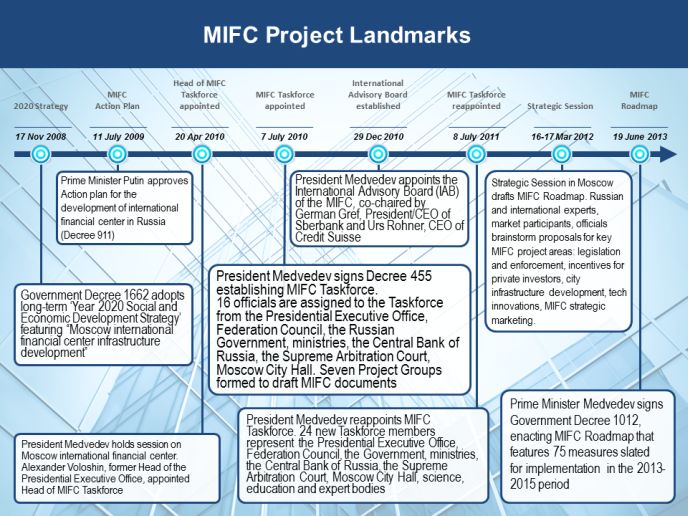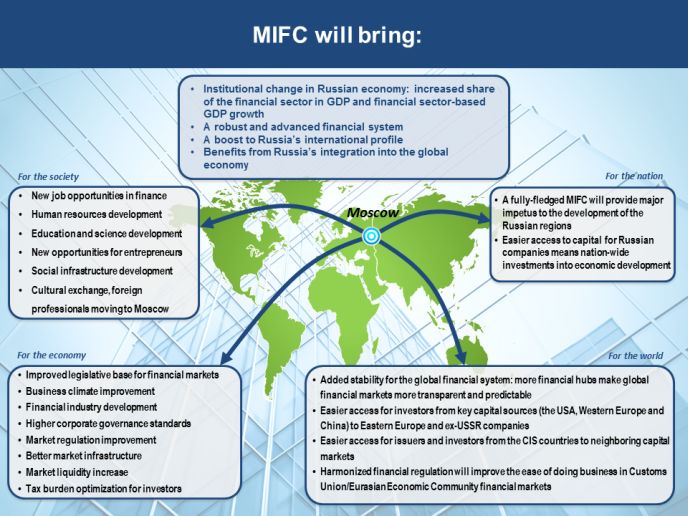Moscow International Financial Center website
This site documents the process of developing Russia's international financial center in the city of Moscow
MIFC Roadmap
03.11.2015 MIFC / Moscow
MIFC Roadmap: Making progress.
October 2015
01.07.2013 MIFC / Moscow
01.07.2013 MIFC / Moscow
Interview with Alexander Voloshin
Events Calendar
| February 2026 | ||||||||||||||||||||||||||||||||||||||||
| Mo | Tu | We | Th | Fr | Sa | Su | ||||||||||||||||||||||||||||||||||
|---|---|---|---|---|---|---|---|---|---|---|---|---|---|---|---|---|---|---|---|---|---|---|---|---|---|---|---|---|---|---|---|---|---|---|---|---|---|---|---|---|
| ||||||||||||||||||||||||||||||||||||||||
MIFC: Key Facts
MIFC is an ongoing process, a community effort by the business, the government and the Russian society in general. MIFC supports the modernization effort, affecting different parts of the economy – from financial markets and overall regulation to science and healthcare.
The global economic and financial crisis of 2008 sent a clear message: the Russian economy lacks diversification, and Russia is in dire need of a competitive financial sector and a professional financial market.
MIFC aims to establish a high-tech, world-class competitive financial market in Russia, create more opportunities for individuals to take part in finance.
The project is driven by the will of professional financial market players to improve the business climate, make the Russian financial market a viable part of the global market, boost its attractiveness for foreign investors and issuers, and create incentives for internal investors.
Project performance. MIFC is a long-term multilevel project. Progress will be marked by indicators such as capitalization growth, improved liquidity, including a rise in cross-border trade volumes, the launch of new financial instruments. Moscow will also gain advanced positions in international financial center ratings.
The cornerstone of the MIFC Project is Government support through multilevel policy coordination focused on MIFC objectives. The Government supports the MIFC Project by:
- establishing MIFC Taskforce as project implementation platform
- approval and performance supervision of MIFC Roadmap by the President and the Government
- liaison with legislature and executive bodies, financial market regulator
- assigning Ministry officials and members of other executive bodies to Project Groups

MIFC TASKFORCE
On 7 July 2010, President Medvedev signed a decree establishing the MIFC Taskforce.
The Head of MIFC Taskforce is Alexander Voloshin, ex-Head of the Presidential Executive Office (1999-2003), former CEO at RAO UES (1999-2008), CEO at First Cargo Company and Uralkaliy, Member of the Board of Directors at Yandex.
MIFC Taskforce members are appointed by the President of the Russian Federation. Since July 2011, MIFC Taskforce comprises of 24 members.
The key function of the Taskforce is to draft and submit MIFC development plans to the President of the Russian Federation and direct MIFC efforts in liaison with state authorities and finance market professionals.
These tasks are performed by permanent and temporary task-specific Project Groups. Members of Project Group are businessmen from investment and financial sectors, experts and ministry officials.
MIFC Project Groups are normally co-chaired – by a business-side and a government-side representative. Participation in Project Group work is voluntary. The main task of the Project Groups is to draft balanced solutions for submission to state legislature.
FORUM ANALYTICAL CENTRE
Forum Analytical Centre Not-for-profit Fund (Chairman of the Board Alexander Voloshin) provides coordination, logistic and analytical support to MIFC Project Groups.
Forum Analytical Centre Not-for-profit Fund is established in accordance with Presidential Decree 455 of 7 July 2010 as a financial markets research and development center to provide consulting support for the International Financial Centre effort in the Russian Federation. The founder of the Fund is the Russian Economic School.
Registered by the Russian Ministry of Justice on 3 November 2010.
Forum Analytical Centre is financed without recourse to the state budget.

REFORMS 2000-2010
Russia’s political and economic turmoil of the 1990’s was followed by successful reforms that benefited the MIFC effort:
- A competitive tax regime
- Capital account liberalization
- Integration mechanisms of the Customs Union and the Eurasian Economic Community
- Successful European integration projects (technical procedures, four Russia-EU Common Spaces)
- Improved business climate for the national industry, including finance, for Russia to join WTO
- Moscow is now developing as an urban agglomeration
MIFC TASKFORCE PROGRESS
2010
- Insider Information and Market Manipulation Act passed
- Amendments to Stock Market Act simplify issue procedure (passed 2012, enacted 2013)
2011
- Clearing Act passed (enacted 2012). Close-out netting introduced to the Russian law – set-off procedures in the event of counterparty bankruptcy, designed to prevent domino effect.Clearing Act passed (enacted 2012). Close-out netting introduced to the Russian law – set-off procedures in the event of counterparty bankruptcy, designed to prevent domino effect.
- Central Depositary Act passed. Following amendments to current Russian laws, foreign depositaries, brokers and dealers are recognized as nominees.
- Integration of Russia’s two key trading floors – MICEX and RTS.
2012
- MIFC Strategic Session drafts the Moscow IFC Roadmap
- President Medvedev introduces Civil Code amendments to the State Duma to reform the concepts of both civil and corporate law
- FFMS awards Central Depositary status to National Settlement Depositary
- Tax Code amendments regulating financial market trading drafted
- Moscow Exchange and Deutsche Boerse sign a partnership agreement in the presence of V. Putin and Angela Merkel
- The Government supports Minfin’s expedited IFRS transfer plan
- Euroclear opens nominee account at NSD. Three months later Clearstream enters the Russian market
2013
- Bank of Russia-based financial market megaregulator in place
- Market participants draft financial market megaregulator KPIs, the Bank of Russia adopts them as market development benchmarks
- Consolidated Financial Reports Act mandatory IFRS requirement enacted 1) for banks and insurance companies; 2) listed companies; 3) entities bound by statutory requirements
- Financial market SRO bill drafted
- Tax Code and Securities Market Act amended to create incentives for private investors
- Tax Code amended to improve taxation of financial market transactions
- Set of Non-state Pension Fund industry reform bills passed, introducing NPF corporatization and pension savings guarantee system. Prudential Oversight implementation roadmap for NPFs drafted
- List of VAT-exempt financial market services approved
- Financial Assets Securitization Act passed
- Civil Code amended to include pledge procedures
- Moscow Exchange floats 30% of own shares and ALROSA landmark privatization
- Listing modernization decisions passed by the regulator and the Moscow Exchange
- Moscow Exchange launches T+ trading
- Securities Market Act amendments passed, introducing two new concepts – general bondholders meeting and bondholders’ representative
2014
- On 30 January, international depositaries Euroclear and Clearstream commence settlement of trades in Russian corporate bonds through the Central Depositary.
- Corporate Governance Code adopted (by Government and Bank of Russia Board of Directors approval). Code recommendations become part of Moscow Exchange Listing Rules. The Government approves a list of state-owned companies for priority Code implementation (Alrosa, Aeroflot, VTB Bank, Russian Railways, Rosseti, Rusgidro, Transneft, Gazprom, Rosneft, Rostelecom, Sberbank, FSK UES).
- Financial Market Digitalization project launched. Bank of Russia Chairman Elvira Nabiullina authorized an inter-ministerial working group to develop Digitalization roadmaps
- New Tax Code amendments entitle Russian citizens to social tax benefits on purchases of long-term life insurance
- The NPF industry has finalized pension funds corporatization
- Foreign securities trading amendments passed
- The Civil Code amended to liberalize corporate governance regulation in non-public joint-stock companies and promote the use of shareholder agreements
- The Civil Code amended to secure Board members’ right to access corporate information and documents
- The Tax Code amended to regulate the taxation of foreign controlled enterprise owners (anti-offshore law)
- Bank of Russia Decree introduced differentiated capital requirements for licensed stock market participants with simplified treatment of limited scope companies
- Forex market regulation law passed
- The Supreme Arbitration Court of Russia passed a decision to promote the application of freedom of contract for private entrepreneurs
2015
- The Civil Code amended to introduce new principles for structuring financial and investment transactions, including indemnity, representations and warranties, and waivers, formerly unavailable in Russia
- Russian Rating Agencies Act drafted
- Repositary legal status amendments passed to the Securities Market Act
- Central Counterparty amendments passed
- Shareholder/JSC E-communication amendments passed
- The Supreme Court passed a directive on court application of Civil Code Part 1 regulations covering private individuals, corporations, trades, GSM decisions and representation
- Amendments on options and other futures transactions with company stakes passed, including transactions with limited liability company stakes
- New Moscow Exchange Corporate Governance Code-based listing rules are introduced
- Financial Market E-communication Roadmap approved by Deputy Prime Minister Dvorkovich
- Tax Code Part 2 amendments passed. Listed Russian corporate bonds and investment fund shares are exempt from profit tax; the securities must be owned for one year instead of five to be eligible. The tax benefit covers listed securities issued by Russian companies with maximum capitalization of RUB 10bln.
2016
- Federal Act 339 “Amendments to Joint-Stock Companies Act” passed 03.07.2016. Amendments simplify additional capitalization for shareholders.
- Federal Act 343 “Amendments to Joint-Stock Company Act and Limited Liability Companies Act” passed 03.07.2016. Amendments regulate material and related party transactions, considerably cutting approval expenses for these transaction types, most of which have been released from mandatory pre-approval.
2017
- Arbitration reform resulted in establishing the Russian Union of Industrialists and Entrepreneurs Arbitration Center, including a Financial Board (by Government Order 798 of 27.04.17), based on the Moscow Exchange Arbitration Committee and NAUFOR Arbitration Court, with leading academics and practicing lawyers with years of experience in financial disputes serving as judges.
- Federal Act 212 “Amendments to Parts I and II of the Civil Code of the Russian Federation” (a MIFC project) passed 26.07.2017. New types of transactions added to Part II of the Civil Code. A new Chapter now regulates escrow. The structure of escrow provides default risk prevention for the main contract, including risks of insufficient counterparty information or low credit quality.
- Federal Act 397 “Amendments to Stock Market Act and Article 3 of Financial Market SRO Act” (a MIFC project) passed 20.12.2017. The Act establishes legal basis for investment consulting. Enactment date 21.12.2018.
- Monitoring of Corporate Governance Code (a MIFC project) implementation in state-owned joint-stock companies completed. The list of companies, approved by First Deputy Prime Minister Shuvalov, includes: Rostelecom, Rosneft, Transneft, Alrosa, RusHydro, Aeroflot, Rosseti, VTB, FSK, Russian Railways, Sovkomflot, Gazprom and Sberbank. Monitoring covered over three years since the Russian Government ordered Corporate Governance Code implementation and three GSM seasons. Results are in public domain.
